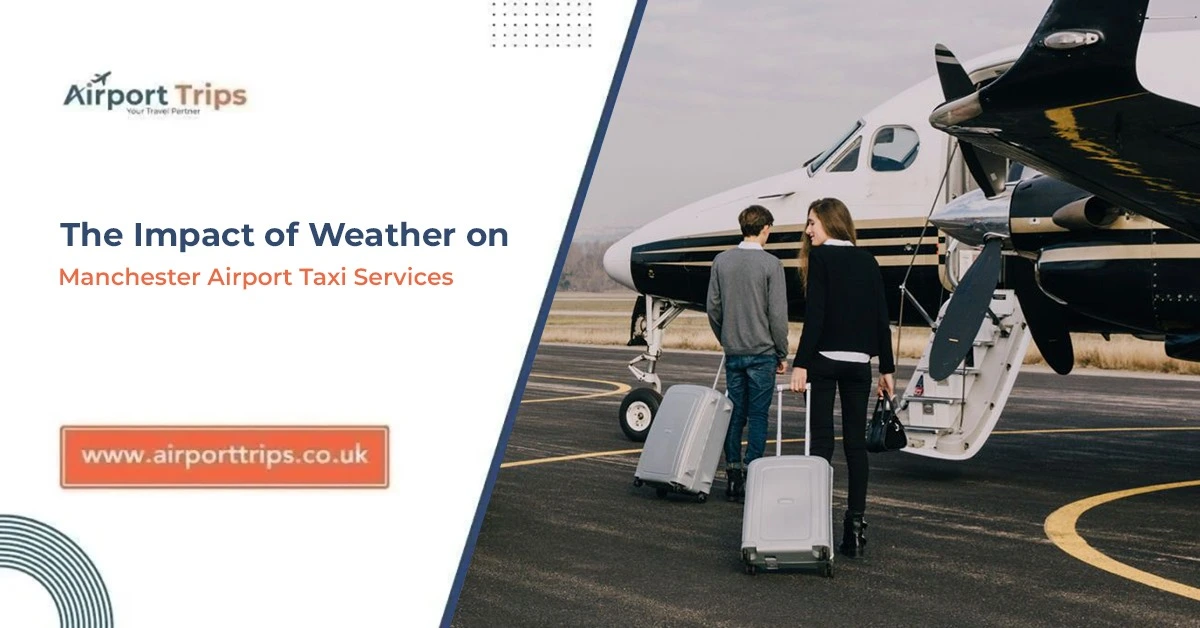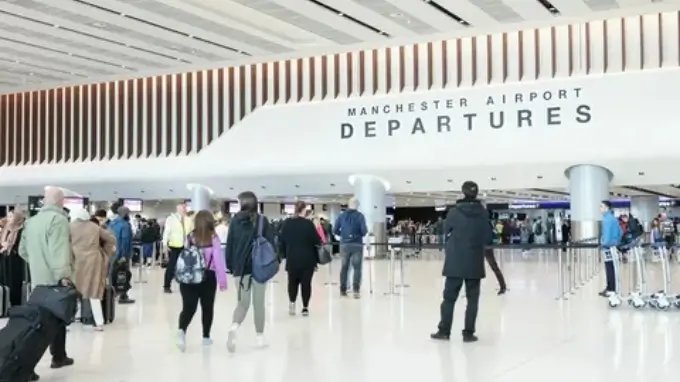The Impact of Weather on Manchester Airport Taxi Services
Introduction
When it comes to airport transfers, passengers rely heavily on taxis for timely arrivals and departures. However, one often overlooked factor that can affect the reliability and comfort of these services is the weather. The weather in Manchester, known for its unpredictable nature, can pose significant challenges for taxi services operating at the airport.
Weather conditions such as rain, snow, fog, and extreme heat can alter the entire experience, from the availability of vehicles to delays in journey times. This article explores the various ways in which weather impacts Manchester airport taxi services and how both operators and passengers can adapt to these changes.
Weather Factors Affecting Taxi Services at Manchester Airport
Several weather-related issues can disrupt the smooth operation of airport taxi services. Whether it’s a sudden downpour, freezing temperatures, or dense fog, the weather influences nearly every aspect of taxi operations. Let’s look at some of the most common weather conditions that pose challenges for taxi services:
- Rain, Snow, Fog, and Ice are just a few of the elements that impact the journey between Manchester Airport and your destination.
- Extreme Heat is another significant weather condition that influences both driver performance and passenger comfort.
How Rain Impacts Manchester Airport Taxi Services
Rain is one of the most common weather challenges for taxi services at Manchester Airport. Not only does it reduce visibility for drivers, but it also affects road conditions, increasing the likelihood of delays.
- Road Hazards: Heavy rain can lead to waterlogging and puddles, making roads slippery and dangerous. This impacts taxi drivers’ ability to drive quickly and safely, resulting in longer journey times.
- Visibility Issues: The constant downpour can obscure vision, especially when combined with headlights from other vehicles. This makes it difficult for drivers to navigate busy roads, leading to potential delays.
- Passenger Comfort: For passengers, rainy weather may mean longer waiting times in the taxi line as fewer drivers are available due to slower traffic.
Taxi services adapt by ensuring vehicles are equipped with quality wipers, and drivers take extra care when driving in the rain, ensuring the safety of both passengers and their vehicles.
Snow and Ice: Major Challenges for Taxi Operations
Winter months in Manchester can bring heavy snow and ice, which present significant challenges for taxi services. These weather conditions create hazardous roads, and the risk of accidents increases.
- Road Safety: Snow and ice can cause major traffic disruptions, leading to slower taxi speeds and potential delays. Ice on the roads also requires taxis to have specialized tires and equipment to ensure a smooth ride.
- Increased Journey Times: In the worst conditions, drivers may have to take longer routes or wait for traffic to clear, increasing overall travel time. As a result, airport passengers may face delays in reaching their destinations.
Taxi companies mitigate these effects by regularly maintaining their vehicles and ensuring that drivers are well-trained in winter driving techniques. Pre-trip vehicle inspections are crucial during the colder months to ensure that taxis can handle harsh weather conditions.
The Effect of Fog on Airport Transfers
Fog is another weather element that can disrupt airport taxi services. Low visibility caused by thick fog is especially problematic during early mornings or late evenings, when visibility is naturally reduced.
- Visibility Reduction: Fog dramatically reduces the distance a driver can see ahead, making it difficult to spot other vehicles, pedestrians, or road signs. This leads to a slower, more cautious driving style.
- Route Adjustments: In foggy conditions, drivers may need to alter their routes to avoid areas with dense fog or more dangerous driving conditions. These detours can lead to longer journeys for passengers.
Taxi services usually employ real-time GPS systems and weather monitoring tools to navigate the fog safely, ensuring passengers still reach their destination despite poor visibility.
Extreme Heat: Effects on Manchester Taxi Services
While snow and rain are typical concerns, extreme heat can also pose challenges for taxi services. Heatwaves, though less frequent, are becoming more common due to climate change and can affect taxi operations in a variety of ways:
- Vehicle Performance: High temperatures can place a strain on taxi engines, especially older models. Air conditioning systems may be overworked, making it difficult to keep the cabin cool and comfortable.
- Passenger Comfort: When temperatures soar, passengers expect cool, air-conditioned taxis, which adds stress to the vehicle’s system. Long waits in the heat can also lead to dissatisfaction.
In these conditions, taxi companies must ensure that their vehicles are equipped with reliable cooling systems and that they are serviced regularly to avoid breakdowns.
How Weather Affects Taxi Availability at Manchester Airport
One of the primary ways that weather impacts Manchester Airport taxi services is through availability. Adverse weather conditions can reduce the number of drivers willing to take passengers, or the number of taxis on the road.
- Demand Fluctuations: In poor weather conditions, passengers may avoid taxis, opting instead for other means of transportation like buses or trains, which can lead to a decrease in taxi availability. Conversely, during weather-related disruptions, demand can spike, making it harder to secure a ride.
Taxi operators often rely on weather forecasting to anticipate demand and adjust their staffing levels accordingly, ensuring that sufficient drivers are available when needed most.
Seasonal Variations in Taxi Demand Due to Weather
The demand for airport taxis in Manchester fluctuates depending on the season. For example, during the winter months, more people tend to rely on taxis due to the inconvenience caused by snow and ice, while in summer, weather-related issues might be less frequent.
- Holiday Season: During colder months or the holiday season, demand for taxis increases due to heavier travel. Drivers may experience longer hours and high demand, which could lead to delays in service.
Preparing for Peak Seasons: Weather Forecasts and Staffing
Taxi services use advanced weather forecasting systems to predict adverse weather and plan staffing accordingly. This helps to prepare for increased demand during holiday seasons or extreme weather events, ensuring passengers are not left stranded at the airport.
How Manchester Taxi Services Adapt to Weather Conditions
Taxi services in Manchester take proactive steps to adapt to changing weather conditions. These include implementing technology solutions, maintaining vehicles, and training drivers to handle extreme conditions.
- Real-Time Weather Tracking: Taxi companies use apps and GPS to track weather patterns and adjust routes accordingly.
- Vehicle Preparation: Taxis undergo regular maintenance, particularly during the winter months, to ensure they are equipped to handle snow, ice, and other weather conditions.
How Taxi Operators Use Technology to Respond to Weather
Technology plays a critical role in ensuring smooth service despite adverse weather. Apps that provide real-time weather updates allow taxi operators to adjust routes instantly. This minimizes delays and enhances customer satisfaction.
Safety Measures Taken by Taxi Companies During Adverse Weather
Passenger and driver safety is the highest priority for any taxi company, especially when weather conditions are less than ideal.
- Vehicle Maintenance: Regular maintenance checks, including tire replacements, brake inspections, and windshield wiper replacements, are essential in ensuring vehicles remain operational during bad weather.
- Driver Training: Taxi drivers undergo special training to handle various weather conditions safely, which ensures that passengers are always in safe hands.
Vehicle Maintenance for Weather Readiness
In anticipation of severe weather, taxi companies ensure that their fleets are regularly serviced to withstand the rigors of snow, rain, and high temperatures. This includes maintaining air conditioning, ensuring tires are winter-ready, and checking heating systems.
Driver Training for Weather-Related Challenges
Drivers are trained in defensive driving techniques, especially when handling adverse weather like icy roads or heavy rain. This ensures that taxis can operate safely and that customers are protected from accidents.
The Role of Weather in Pricing and Fares
Weather conditions can also impact the cost of a taxi ride. For example, during severe weather, taxi fares may increase due to demand and operational difficulties.
- Surge Pricing During Adverse Weather Conditions: Just like ride-hailing services, traditional taxi services may implement surge pricing during extreme weather to account for the challenges involved.
Surge Pricing During Adverse Weather Conditions
During times of high demand or dangerous conditions, taxi companies may increase their prices to reflect the difficulties drivers face and the need for additional services.
Customer Experience During Weather-Related Delays
Weather-related delays can significantly affect passenger satisfaction. Taxi companies must communicate effectively with passengers during delays to ensure that they are informed and feel valued.
Communicating Delays Effectively to Customers
Effective communication channels, such as SMS updates or mobile app notifications, help ensure passengers are informed in real time about delays, estimated arrival times, and route changes during adverse weather.
The Future: Technological Advances in Weather-Responsive Taxi Services
Looking ahead, technological advancements may reduce the impact of weather on taxi services, making the experience smoother for both drivers and passengers.
- AI and Autonomous Vehicles: The potential for autonomous vehicles could revolutionize how taxis operate in all weather conditions. These vehicles would be able to navigate adverse weather more efficiently and reduce the risk of human error.
Autonomous Vehicles and Weather Adaptation
Self-driving taxis will have the ability to adapt to weather conditions with sophisticated sensors and AI, minimizing delays caused by weather and improving safety for all passengers.
Conclusion:
Weather is an uncontrollable force that affects taxi services at Manchester Airport. Whether it’s snow, rain, or fog, these conditions require taxis to adjust their operations accordingly. By maintaining vehicles, training drivers, and implementing technology solutions, taxi companies can ensure a safe and efficient service, even in adverse weather conditions.






